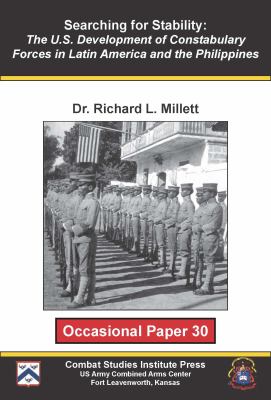
e-Document
|
Searching for stability : the U.S. development of constabulary forces in Latin America and the Philippines
-- U.S. development of constabulary forces in Latin America and the Philippines
Copies
0 Total copies, 0 Copies are in,
0 Copies are out.
Title
Searching for stability : the U.S. development of constabulary forces in Latin America and the Philippines -- U.S. development of constabulary forces in Latin America and the Philippines
Call No
CDMC Combat Studies Institute (CSI)
Digital Link
Subjects
Police training--Caribbean Area--History--20th century.
Police training--Philippines--History--20th century.
Police--Philippines--History--20th century.
Police--Caribbean Area--History--20th century.
Military assistance, American--Caribbean Area--History--20th century.
Military assistance, American--Philippines--History--20th century.
United States--Armed Forces--Stability operations--History--20th century.
Police training--Philippines--History--20th century.
Police--Philippines--History--20th century.
Police--Caribbean Area--History--20th century.
Military assistance, American--Caribbean Area--History--20th century.
Military assistance, American--Philippines--History--20th century.
United States--Armed Forces--Stability operations--History--20th century.
Language
English
Published
Fort Leavenworth, Kan. : US Army Combined Arms Center, Combat Studies Institute, 2010.
Publication Desc
1 online resource (viii, 143 pages) : maps.
Series
Target Audience
Unknown or not specified









